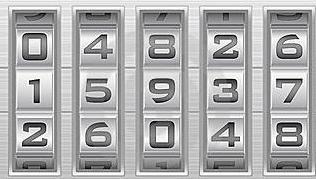Consider a -slot combination lock where each slot contains a dial numbered with the ten sequential decimal integers in the inclusive range from to . In one operation, you can choose a slot and rotate the dial by one click, either in the positive direction (to increase the displayed number by ) or the negative direction (to decrease the displayed number by ). Note that, due to the cyclical nature of the dial, the next number after is and the number before is ). For example, if the number is currently displayed on the dial, you can rotate the dial to either (positive direction) or (negative direction) in a single operation.

Given the initial configuration of numbers in each slot and some desired configuration of numbers, determine the minimum number of operations you must perform to change the lock's slots to the desired configuration.
Input Format
The first line contains space-separated integers denoting the current slot configuration.
The second line contains space-separated integers denoting the desired slot configuration.
The second line contains space-separated integers denoting the desired slot configuration.
Constraints
- Each number in a slot is .
Output Format
Print a single integer denoting the minimum number of moves to change this configuration to the correct one.
Sample Input
1 2 9 5 7
1 3 2 0 7
Sample Output
9
Explanation
We perform the following operations on each slot:
- Slot : We rotate the dial times because this slot is already displaying the desired number (i.e., ).
- Slot : We rotate the dial time, changing it from .
- Slot : We rotate the dial times, changing it from .
- Slot : We rotate the dial times, changing it from .
- Slot : We rotate the dial times because this slot is already displaying the desired number (i.e., ).
Finally, we sum the number of operations performed at each slot: . Thus, we print as our answer.
Source Code: